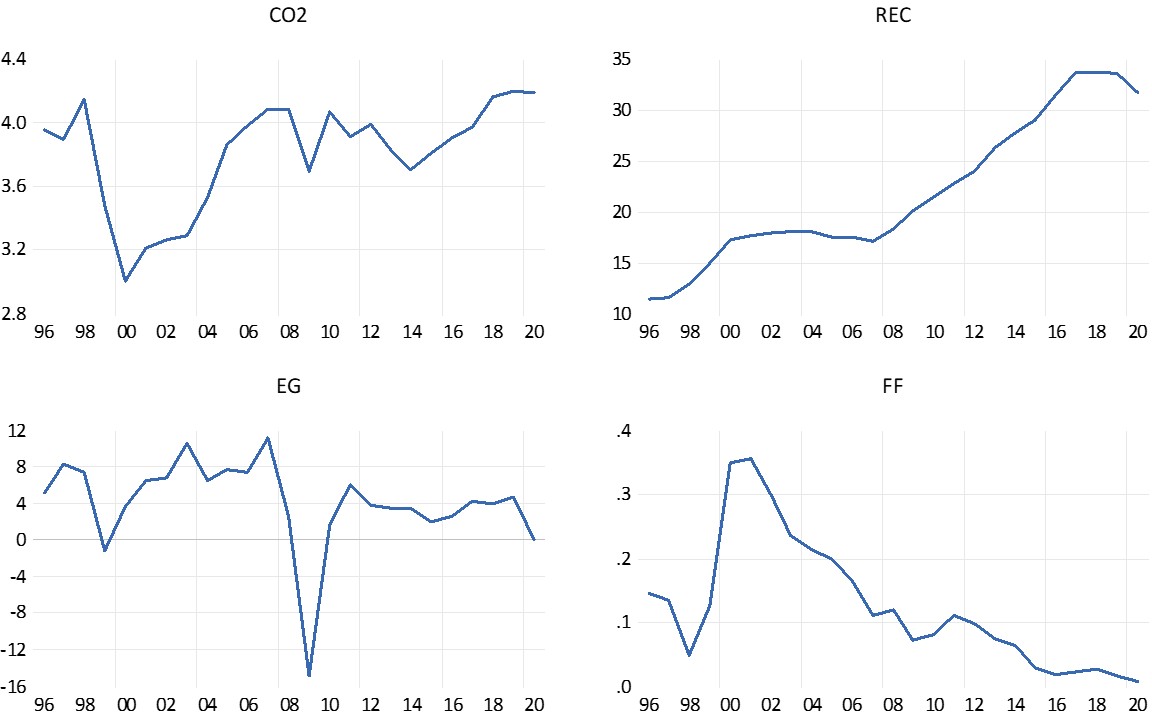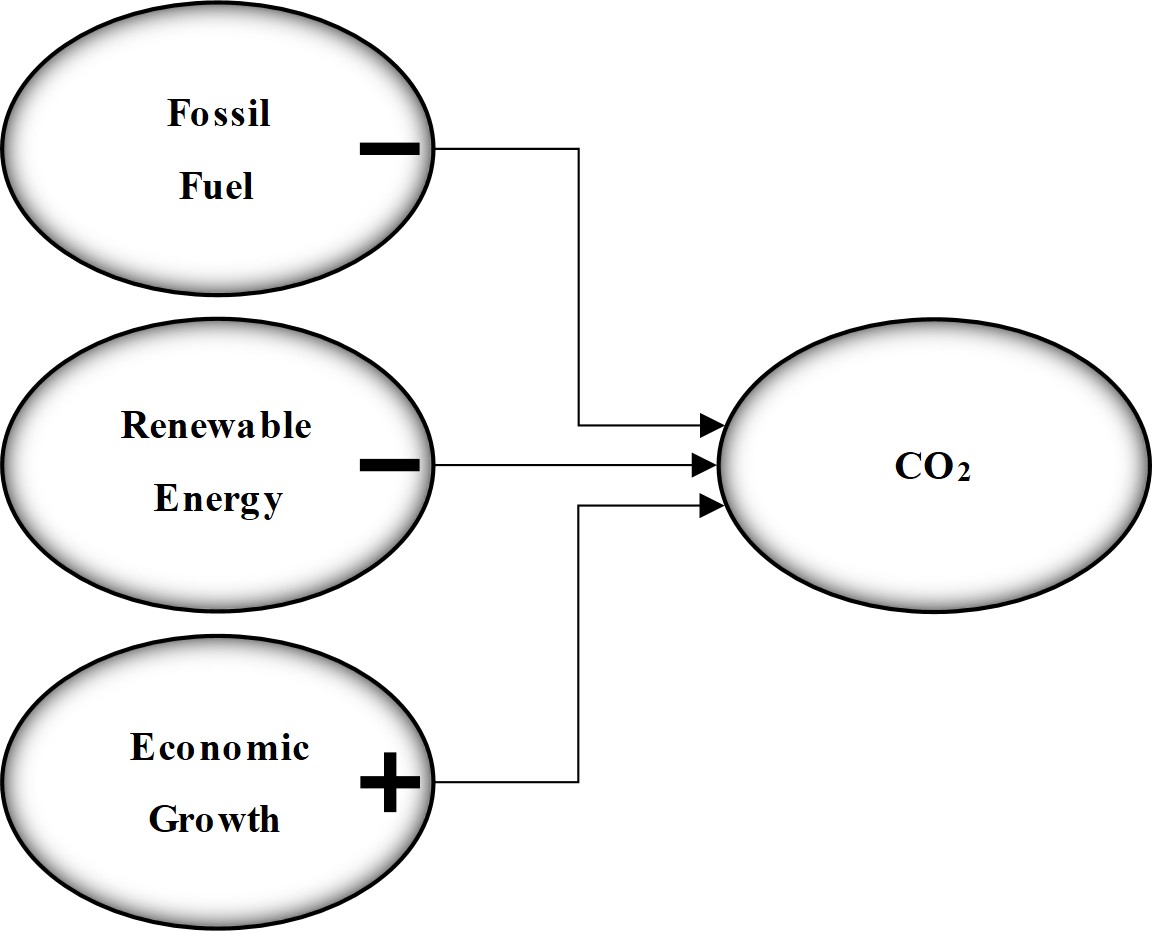Scopus Indexed
Scopus Indexed
Article Peer-Reviewed
The Impact of Fossil Fuel Consumption, Renewable Energies, and Economic Growth on Environment Change in Lithuania
1
Department of Banking and Accounting, Near East University, Nicosia, Cyprus
2
Department of Economics, Near East University, Nicosia, Cyprus
*
For correspondence.
Academic Editor:
Received: 20 June 2024 Accepted: 30 January 2025 Published: 22 February 2025
This article is part of the Special Issue Economic Growth and Environmental Degradation.
Abstract
The world is approaching a critical juncture beyond which climate change may become irreversible, threatening the entitlement of current and future generations to a healthy and sustainable planet. Therefore, this study assesses the impact of fossil fuels, renewable energy, and economic growth on carbon dioxide (CO2) emissions in Lithuania, using data from 1996 to 2020. The Autoregressive Distributed Lag (ARDL) bound test is employed to examine the long-term relationship between these variables. Additionally, the ARDL model is used to evaluate the individual effects of each variable on CO2 emissions. Surprisingly, the findings reveal that fossil fuels reduce the harmful impact of carbon emissions in Lithuania, while investment in renewable energy mitigates and alleviates these emissions. However, economic growth is positively and significantly associated with an increase in carbon emissions, suggesting that emissions will rise as the economy expands. These results advocate for policies that promote sustainable economic growth, foster the adoption of environmentally friendly investments, and enhance resilience to mitigate CO2 emissions and address climate change in Lithuania.
Figures in this Article
Would you like to reuse the images? Contact the journal editorial office to obtain high-quality versions.
Keywords
Copyright © 2025
Diaby et al. This article is distributed under the terms of the Creative Commons Attribution License (CC BY 4.0), which permits unrestricted use and distribution provided that the original work is properly cited.
Funding
This research received no specific grant from any funding agency in the public, commercial, or not-for-profit sectors.
Cite this Article
Diaby, A., Seraj, M., & Ozdeser, H. (2025). The Impact of Fossil Fuel Consumption, Renewable Energies, and Economic Growth on Environment Change in Lithuania. Highlights of Sustainability, 4(1), 56–68. https://doi.org/10.54175/hsustain4010004
References
1.
Masson-Delmotte, V., Zhai, P., Pirani, S., Connors, C., Péan, S., Berger, N., et al. (2021). IPCC, 2021: Summary for policymakers. In Climate change 2021: The physical science basis. contribution of working group I to the sixth assessment report of the intergovernmental panel on climate change.
2.
Husaini, D. C., Manzur, K., & Medrano, J. (2024). Indoor and outdoor air pollutants as emerging public health threat in Latin America and the Caribbean: a systematic review. Arab Gulf Journal of Scientific Research, 42(1), 134–145. https://doi.org/10.1108/AGJSR-08-2022-0140
3.
Ahmed, S., Li, T., Yi, P., & Chen, R. (2023). Environmental impact assessment of green ammonia-powered very large tanker ship for decarbonized future shipping operations. Renewable and Sustainable Energy Reviews, 188, 113774. https://doi.org/10.1016/j.rser.2023.113774
4.
Edenhofer, O., Pichs-Madruga, R., Sokona, Y., Seyboth, K., Kadner, S., Zwickel, T., et al. (2011). Renewable energy sources and climate change mitigation: Special report of the intergovernmental panel on climate change. Cambridge University Press.
5.
Towoju, O. A., & Oladele, O. A. (2021). Electricity generation from hydro, wind, solar and the environment. Engineering and Technology Journal, 39(9), 1392–1398. https://doi.org/10.30684/etj.v39i9.2145
6.
Gaigalis, V., & Katinas, V. (2020). Analysis of the renewable energy implementation and prediction prospects in compliance with the EU policy: A case of Lithuania. Renewable Energy, 151, 1016–1027. https://doi.org/10.1016/j.renene.2019.11.091
7.
Owusu, P. A., & Asumadu-Sarkodie, S. (2016). A review of renewable energy sources, sustainability issues and climate change mitigation. Cogent Engineering, 3(1), 1167990. https://doi.org/10.1080/23311916.2016.1167990
8.
Sen, S., & Ganguly, S. (2017). Opportunities, barriers and issues with renewable energy development—A discussion. Renewable and Sustainable Energy Reviews, 69, 1170–1181. https://doi.org/10.1016/j.rser.2016.09.137
9.
Batra, G. (2023). Renewable energy economics: achieving harmony between environmental protection and economic goals. Social Science Chronicle, 2(2), 1–32.
10.
Visockas, D. (2023). The impact of the covid-19 pandemic on financial stability [Master’s Thesis]. Vilniaus universitetas.
11.
IEA. (2020). Global energy review 2020—Ukraine. https://www.iea.org/countries/ukraine (accessed 10 September 2020).
12.
Martins, T., Barreto, A. C., Souza, F. M., & Souza, A. M. (2021). Fossil fuels consumption and carbon dioxide emissions in G7 countries: Empirical evidence from ARDL bounds testing approach. Environmental Pollution, 291, 118093. https://doi.org/10.1016/j.envpol.2021.118093
13.
Zhang, Y., Li, L., Sadiq, M., & Chien, F. (2024). The impact of non-renewable energy production and energy usage on carbon emissions: evidence from China. Energy & Environment, 35(4), 2248–2269. https://doi.org/10.1177/0958305X221150
14.
Ogundipe, A. A., Okwara, C., & Ogundipe, O. M. (2020). CO2 emissions and environmental implications in Nigeria. International Journal of Energy Economics and Policy, 10(3), 317–324. https://doi.org/10.32479/ijeep.8050
15.
Botello, A., Ponce-Velez, G., Soto, L., & Villanueva, S. (2017). The issue of fossil fuels at the ocean: Emissions to the sea and contribution to global CO2. In Marine Pollution and Climate Change (pp. 66–98). CRC Press.
16.
Hou, K., Qammar, R., Zhu, C., Usman, M., & Abbas, S. (2023). Testing the resources curse hypothesis: Unleashing the role of national governance and financial development in OPEC countries. Resources Policy, 86, 104242. https://doi.org/10.1016/j.resourpol.2023.104242
17.
Ali, M., Igunnu, P. O., & Tursoy, T. (2024). Do green finance and energy prices unlock environmental sustainability in Pakistan? Fresh evidence from RALS‐EG cointegration. OPEC Energy Review, 48(4), 370–390. https://doi.org/10.1111/opec.12319
18.
Aali, T. R., Khan, A. A., Khan, G. Y., Batool, K., & Malik, U. M. (2024). Impact of Fossil Fuel, Renewable Energy, and Public-Private Partnership Investments on Sustainable Growth and Carbon Emissions in Pakistan. Social Science Review Archives, 2(2), 1399–1415.
19.
Cao, J., Zhang, J., Chen, Y., Fan, R., Xu, L., Wu, E., et al. (2023). Current status, future prediction and offset potential of fossil fuel CO2 emissions in China. Journal of Cleaner Production, 426, 139207. https://doi.org/10.1016/j.jclepro.2023.139207
20.
Azam, A., Rafiq, M., Shafique, M., & Yuan, J. (2022). Towards achieving environmental sustainability: the role of nuclear energy, renewable energy, and ICT in the top-five carbon emitting countries. Frontiers in Energy Research, 9, 804706. https://doi.org/10.3389/fenrg.2021.804706
21.
Javed, A., Subhani, B. H., Javed, A., & Rapposelli, A. (2024). Accessing the efficacy of green growth, energy efficiency, and green innovation for environmental performance in top manufacturing nations in the framework of sustainable development. Quality & Quantity, 58, 5829–5863. https://doi.org/10.1007/s11135-024-01918-6
22.
Shafiq, I., Shafique, S., Akhter, P., Ishaq, M., Yang, W., & Hussain, M. (2021). Recent breakthroughs in deep aerobic oxidative desulfurization of petroleum refinery products. Journal of Cleaner Production, 294, 125731. https://doi.org/10.1016/j.jclepro.2020.125731
23.
Matori, S. S. (2024). Energy transition and climate-related policies: A changing environment and its implications for OPEC countries [Master’s Thesis]. Technische Universität Wien.
24.
Salari, M., & Javid, R. J. (2017). Modeling household energy expenditure in the United States. Renewable and Sustainable Energy Reviews, 69, 822–832. https://doi.org/10.1016/j.rser.2016.11.183
25.
Spandagos, C., & Ng, T. L. (2018). Fuzzy model of residential energy decision-making considering behavioral economic concepts. Applied Energy, 213, 611–625. https://doi.org/10.1016/j.apenergy.2017.10.112
26.
Javed, A., Fuinhas, J. A., & Rapposelli, A. (2023). Asymmetric nexus between green technology innovations, economic policy uncertainty, and environmental sustainability: evidence from Italy. Energies, 16(8), 3557. https://doi.org/10.3390/en16083557
27.
Schröder, E., & Storm, S. (2020). Economic growth and carbon emissions: The road to “hothouse earth” is paved with good intentions. International Journal of Political Economy, 49(2), 153–173.
28.
Li, J., Zhang, X., Ali, S., & Khan, Z. (2020). Eco-innovation and energy productivity: New determinants of renewable energy consumption. Journal of Environmental Management, 271, 111028. https://doi.org/10.1016/j.jenvman.2020.111028
29.
Yang, Z., Abbas, Q., Hanif, I., Alharthi, M., Taghizadeh-Hesary, F., Aziz, B., et al. (2021). Short-and long-run influence of energy utilization and economic growth on carbon discharge in emerging SREB economies. Renewable Energy, 165, 43–51. https://doi.org/10.1016/j.renene.2020.10.141
30.
Khan, M. B., Saleem, H., Shabbir, M. S., & Huobao, X. (2022). The effects of globalization, energy consumption and economic growth on carbon dioxide emissions in South Asian countries. Energy & Environment, 33(1), 107–134. https://doi.org/10.1177/0958305X20986896
31.
Osobajo, O. A., Otitoju, A., Otitoju, M. A., & Oke, A. (2020). The impact of energy consumption and economic growth on carbon dioxide emissions. Sustainability, 12(19), 7965. https://doi.org/10.3390/su12197965
32.
Raihan, A., Muhtasim, D. A., Farhana, S., Hasan, M. A. U., Pavel, M. I., et al. (2022). Nexus between economic growth, energy use, urbanization, agricultural productivity, and carbon dioxide emissions: New insights from Bangladesh. Energy Nexus, 8, 100144. https://doi.org/10.1016/j.nexus.2022.100144
33.
Witt, A., Kurths, J., & Pikovsky, A. (1998). Testing stationarity in time series. Physical Review E, 58(2), 1800.
34.
Sufyanullah, K., Ahmad, K. A., & Ali, M. A. S. (2022). Does emission of carbon dioxide is impacted by urbanization? An empirical study of urbanization, energy consumption, economic growth and carbon emissions-Using ARDL bound testing approach. Energy Policy, 164, 112908. https://doi.org/10.1016/j.enpol.2022.112908
35.
Pesaran, M. H., Shin, Y., & Smith, R. J. (2001). Bounds testing approaches to the analysis of level relationships. Journal of Applied Econometrics, 16(3), 289–326. https://doi.org/10.1002/jae.616
Metrics
Loading...
Journal Menu
Journal Contact
Highlights of Sustainability
Editorial Office
Highlights of Science
Avenida Madrid, 189-195, 3-3
08014 Barcelona, Spain
08014 Barcelona, Spain
Cathy Wang
Managing Editor



